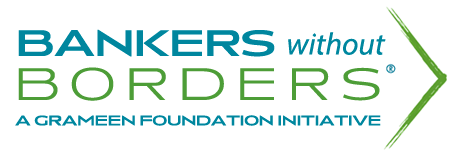A Small Team, A Positive Impact
By By Bankers without Borders® Volunteers Shelley Jennings, Jan Buresh and Judith
Three small fish in the global pond. Could we make a difference in the world of microfinance?
The assignment offered to us was not one that would attract throngs of volunteers - evaluate proposed changes in selected SEEP ratios and comment on their value to the boards and managements of micro-finance institutions. No glamour or foreign travel. But it was perfect for us. Spurred by our shared interest in microfinance, we called on our disparate business experience (banking; corporate financial management; consulting) to write the analysis in less than a week.
THE ASSIGNMENT
Assist the SEEP Network Financial Services Working Group in its project to update the SEEP Framework, a set of financial ratios fundamental to understanding the financial health of microfinance institutions. The specific objective of the SEEP project is to increase the standardization of financial reporting in the microfinance industry. The Framework was originally published in 2004, and the current revision process has involved more than 200 microfinance stakeholders including investors, raters, MFI, MIS providers and others. In addition to commenting on the construction and value of the ratios to risk assessment, we were to comment on the consistency of the ratios with Basel standards.
Bankers Without Borders requested our comments prior to the revised Framework is distributed to MFIs and stakeholders worldwide, using our technical financial and accounting experience to evaluate the contents of the draft.
OUR PROFESSIONAL EXPERIENCE
Jan Buresh - career in commercial banking, providing loans and other services to large, publicly traded corporations. In addition, she has consulting experience related to Basel, risk modeling and agribusiness finance. She consults with micro-finance and bank lenders on access to finance policies and training needs.
Judith Hermanson – leader of major non-profit pioneering microfinance of housing; significant experience in various types of microfinance programs (including partnering with commercial banks) through design, writing and analysis of proposed activities, as well as governance and oversight of monitoring functions. She has served on numerous MFI Boards and has more than 20 years of international development and non-profit management.
Shelley Jennings - executive experience in corporate finance and treasury management for a publicly traded US utility company, financial statement analysis, and oversight of financial risk compliance. She has also travelled to Ghana as a representative of an MFI and is on the institution's Board of Governors.
THE PROJECT
The three of us had not previous worked together and did not know when we took the assignment how well our different professional experiences and training would affect the final work product. In fact, it was because of our varied yet complementary experiences that we were able to develop an inter-disciplinary approach and create a commentary that incorporates our different perspectives, with a goal of addressing concerns of many stakeholders in an MFI.
Key printed materials were sent to us electronically by the Grameen staff in advance of our scheduled work date so that we each had time to review the information and think about the SEEP Framework and the specific task we were to accomplish. We divided the work among the three of us based on our relevant business experience and prepared written analyses of our assigned sections. As a next step, We met at the Washington, DC offices of the Grameen Foundation so that we could each read the sections written by the other two, then ask clarifying questions, discuss technical points, and ultimately produced a document that was responsive to the assignment.
THE RESULT
From start to finish, the project took less than a week of concentrated effort. After we submitted our completed report, we responded to questions and comments from a member of the Grameen team, making appropriate revisions in our work. The document has now been submitted to the SEEP task force and incorporated into the much larger draft of the document that will ultimately replace the SEEP Framework. We now have the opportunity to provide comments on the draft of the more detailed standards for financial reporting, analysis and monitoring for MFIs.
Working as a team was both fun and educational. We each learned more about microfinance and performance standards than we had previously known. In addition, we each have the personal satisfaction of knowing that our work might just have a positive impact on a cause we support -- continuing success of microfinance institutions.
Disclaimer: The views represented here are solely those of the volunteer and do not necessarily represent the views of Bankers without Borders, Grameen Foundation, our sponsors, the microfinance institutions, or the volunteer’s employer.

